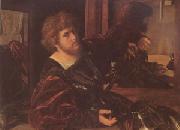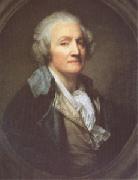
Oil On
Canvas, Real Flavor of Old Masters
|
SAVOLDO, Giovanni Girolamo
|
|||
|
|
|||
| Italian Mannerist Painter, ca.1480-1548 | |||
|
|
|||
|
|
Portrait of the Artist (mk05) new5/SAVOLDO, Giovanni Girolamo-364338.jpg Painting ID:: 20307 Visit European Gallery |
Canvas,36 x 48 1/2''(91 x 123 cm)Collection of Francois | |
Height Width |
INS/CM |
||
|
X |
|
||
|
|
|||
|
Jean Baptiste Greuze
|
|||
|
|
|||
| 1725-1805 French Jean Baptiste Greuze Galleries French painter and draughtsman. He was named an associate member of the Academie Royale de Peinture et de Sculpture, Paris, in 1755 on the strength of a group of paintings that included genre scenes, portraits and studies of expressive heads (t?tes d'expression). These remained the essential subjects of his art for the next 50 years, except for a brief, concentrated and unsuccessful experiment with history painting in the late 1760s, which was to affect his later genre painting deeply. Though his art has often been compared with that of Jean-Simeon Chardin in particular and interpreted within the context of NEO-CLASSICISM in general, it stands so strikingly apart from the currents of its time that Greuze's accomplishments are best described, as they often were by the artist's contemporaries, as unique. He was greatly admired by connoisseurs, critics and the general public throughout most of his life. His pictures were in the collections of such noted connoisseurs as Ange-Laurent de La Live de Jully, Claude-Henri Watelet and Etienne-Francois, Duc de Choiseul. For a long period he was in particular favour with the critic Denis Diderot, who wrote about him in the Salon reviews that he published in Melchior Grimm's privately circulated Correspondance litteraire. His reputation declined towards the end of his life and through the early part of the 19th century, to be revived after 1850, when 18th-century painting returned to favour, by such critics as Th?ophile Thore, Arsene Houssaye and, most notably, Edmond and Jules de Goncourt in their book L'Art du dix-huiti?me siecle. By the end of the century Greuze's work, especially his many variations on the Head of a Girl, fetched record prices, and his Broken Pitcher (Paris, Louvre) was one of the most popular paintings in the Louvre. The advent of modernism in the early decades of the 20th century totally obliterated Greuze's reputation. It was only in the 1970s, with Brookner's monograph, Munhall's first comprehensive exhibition of the artist's work, increased sale prices, important museum acquisitions and fresh analyses of his art by young historians, that Greuze began to regain the important place that he merits in the history of French art of the 18th century. | |||
|
|
|||
|
|
Portrait of the Artist (mk05) new6/Jean Baptiste Greuze-258465.jpg Painting ID:: 20750 Visit European Gallery |
Wood 25 1/2 x 20 1/2''(65 x 52 cm)Bequest of Dr Louis La Caze 1869 | |
Height Width |
INS/CM |
||
|
X |
|
||
|
|
|||
|
Jacques-Louis David
|
|||
|
|
|||
| French b.Aug. 30, 1748, Paris d.Dec. 29, 1825, Brussels Jacques-Louis David is famous for his huge, dramatic canvasses of Napoleon and other historical figures, including Oath of the Horatii (1784), Death of Marat (1793) and The Sabine Women (1799). Early in his career he was a leader in the neoclassical movement; later his subjects became more modern and political. David was himself active in the French Revolution as a supporter of Robespierre and is sometimes called the chief propagandist for the Revolution; after the Reign of Terror ended he was briefly imprisoned for his actions. When Napoleon took power David became his court painter and created several grand canvasses of the Emperor, including the heroic Napoleon Bonaparte Crossing the Alps (1801) and the enormous Coronation of Napoleon and Josephine (1807). David also painted Napoleon in His Study (1812), with its famous image of Napoleon with one hand tucked inside his vest. After Napoleon ouster David went in exile to Brussels, where he remained until his 1825 death | |||
|
|
|||
|
|
Portrait of the Artist (mk05) new6/Jacques-Louis David-823376.jpg Painting ID:: 20790 Visit European Gallery |
1794 Canvas 32 x 25 1/4''(81 x 64 cm)Given by Eugene Isbey in 1852 INV | |
Height Width |
INS/CM |
||
|
X |
|
||
|
|
|||
|
Jean Baptiste Camille Corot
|
|||
|
|
|||
| 1796-1875 Corot Locations French painter, draughtsman and printmaker. After a classical education at the College de Rouen, where he did not distinguish himself, and an unsuccessful apprenticeship with two drapers, Corot was allowed to devote himself to painting at the age of 26. He was given some money that had been intended for his sister, who had died in 1821, and this, together with what we must assume was his family continued generosity, freed him from financial worries and from having to sell his paintings to earn a living. Corot chose to follow a modified academic course of training. He did not enrol in the Ecole des Beaux-Arts but studied instead with Achille Etna Michallon and, after Michallon death in 1822, with Jean-Victor Bertin. Both had been pupils of Pierre-Henri Valenciennes, and, although in later years Corot denied that he had learnt anything of value from his teachers, his career as a whole shows his attachment to the principles of historic landscape painting which they professed. | |||
|
|
|||
|
|
Portrait of the artist (mk05) new6/Jean Baptiste Camille Corot-238696.jpg Painting ID:: 20886 Visit European Gallery |
1825 Paper on canvas 13 x 10''(33 x 25 cm)Given in 1906 R.F 1608(G/AR) | |
Height Width |
INS/CM |
||
|
X |
|
||
|
|
|||










